FUTURE THEMES PORTFOLIO HEALTH & BIOTECHNOLOGY
Investment potential with winning DNA
Great innovations and steady growth in all medical fields
Since the end of the Second World War at the latest, the very complex field of pharmaceutical and medical technology research has taken on an extremely high and indispensable significance in any flanking of an equally civilizing and humane further development of society, while at the same time guaranteeing the greatest possible protection of health, which could otherwise very quickly be jeopardized by rapid technological, environmental and civilizing “degenerated” changes in behavior without the corresponding risk aversion of the latest medical achievements.
The constant innovative, pharmacological and technological advancements of the entire medical technology have been developing for decades at such a breathtaking and unstoppable speed that the miracles of Jesus in the Biblical Middle Ages, “making the blind see, the paralyzed walk, the mute speak and the deaf hear”, have long since become reality today through the use of appropriate medical devices and operations.
And not only are such mobility and sensor technologies (e.g., via pulse-triggering exoskeletons, laryngeal microphones, ocular cataract operations, or increasingly sophisticated hearing aid systems) being further developed by corresponding medical research to be ever more precise and at the same time more intervention-friendly (buzzword “minimally invasive”).
In addition, it has been possible to treat even formerly fatal or chronic diseases more and more successfully in recent years by means of the most targeted therapy developments or, in some cases, revolutionary new organ transplantation techniques.
For this reason in particular – and not only because of a natural increase in disease resistance among people, which is also to be attested – the current average life expectancy among adults worldwide has already been increased from the beginning of the 1950s (average 76 years) to around 81 years (with a further estimated increase to around 84 years by the end of 2050)and, in addition, the mortality rate of children under the age of 5, which was still over 20% worldwide at the beginning of the 1950s due to the developing continents of Africa and Asia, has now also been reduced to a still considerable level of 2.5%.
Pharmaceutical and medical technology research, which has at all times been active in its constant life-sustaining and quality-improving social mission, is not stopping in any way, even at this point of impressively achieved progress results worldwide (and of course again immensely fueled by the current Corona virus pandemic), but continues to work in its fundamental professional and social ethos and also worldwide with gratifyingly sustainable support through corresponding health policy budget expansions (globally currently just under 9 % of the worldwide GDP, in 1950 only about 1 %). 1 %), it continues to work with unbroken high pressure on any further elimination of global medical undersupply of the population as well as the constant closing of further gaps in medical research.
The most current relevant fields of therapy are in particular the treatment of chronic/rare as well as acute immune diseases, which will presumably be significantly improved in the future, with the aid of natural human DNA, enzyme and antibody structures, but also, for example, in the orthopedic field, the development of body prostheses of all kinds that are even more precise, last longer and can be used without pain than has been possible in recent decades by means of 4D printing.
Innovative growth and the acceptance of demand for all conceivable medical breakthroughs (assuming average future government healthcare budget increases of around 3-5% p.a., as estimated by experts) should therefore not suffer the slightest setback in the coming years, so that in our view at least the pharmaceutical and medical technology companies with the best position in their respective segments should continue to record clear double-digit percentage growth in profits year after year with maximum transparency.
In this context, this highly stable growth segment, which is fully represented in the MSCI World Healthcare Index (currently 153 stocks) with a P/E ratio (2021 e) of only 17.9( = perversely, even a P/E valuation discount of more than 10% compared to the entire MSCI World index) is, in our view, currently grossly undervalued and must therefore continue to be classified as one of the most attractive thematic areas for equity investments in the future. Lucrum Capital AG will take this into account-especially against the background of the current challenges of the Corona Pandemic-with the very targeted composition and the asset management offer of an appropriately future oriented thematic stock portfolio Health & Biotechnology, in which only those stocks will be included in a completely global and thus very flexible selection, whose pharmaceutical and technology research positions the portfolio management sees as having the highest and most sustainable earnings expansion potential in the future. Therefore, you can benefit from the expected high return prospects of this thematically highly attractive portfolio component in the long term.
